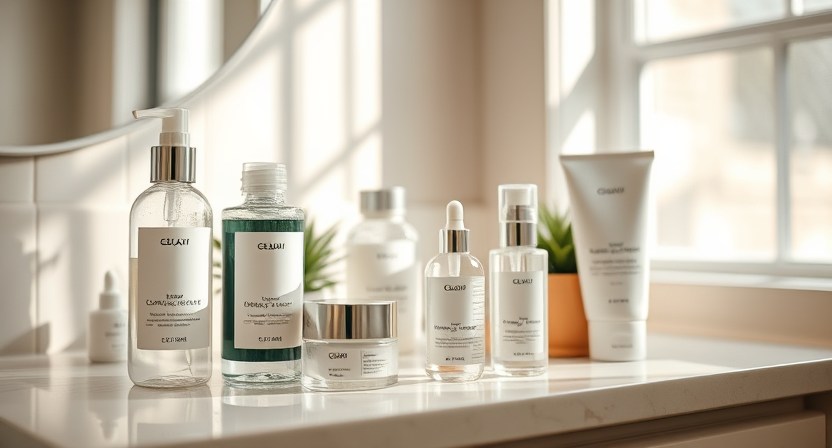
Skincare 101: Building a Routine for Radiant, Healthy Skin
The Importance of Establishing a Daily Skincare Routine

Establishing a daily skincare routine is crucial for maintaining healthy and vibrant skin. Consistency is key in ensuring that your skin is properly cared for and protected from external aggressors. By incorporating regular skincare habits into your daily regimen, you can address concerns such as hydration, aging, and blemishes effectively.
Daily cleansing, moisturizing, and sun protection are fundamental steps that should not be overlooked. Cleansing helps to remove impurities and excess oil from the skin, while moisturizing keeps the skin hydrated and supple. Sun protection is essential in safeguarding the skin from harmful UV rays that can cause premature aging and damage. By making these practices a part of your daily routine, you are investing in the long-term health and appearance of your skin.
Identifying Your Skin Type

Identifying your skin type is crucial in establishing an effective skincare routine that caters to your specific needs. There are generally four main skin types: normal, oily, dry, and combination. Normal skin is typically balanced, neither too oily nor too dry, with small pores and few imperfections. Oily skin tends to produce excess oil, leading to shine and potential breakouts. Dry skin lacks moisture, often feeling tight and rough, and may be prone to flakiness. Combination skin is a mix of oily and dry areas, with some areas being oilier than others. By determining your skin type, you can select the most suitable products to maintain a healthy complexion.
One common way to identify your skin type is by observing how it behaves throughout the day. Notice whether your skin feels oily, dry, or balanced, and how it reacts to different products. Pay attention to the size of your pores, the presence of acne or blemishes, and any redness or sensitivity. Consulting with a skincare professional or dermatologist can also provide valuable insights into your skin type and recommend tailored products and routines to address specific concerns. Understanding your skin type is the first step towards achieving radiant and healthy skin.
Choosing the Right Cleanser for Your Skin

When it comes to selecting the appropriate cleanser for your skin, it’s crucial to consider your skin type and any specific concerns you may have. For those with oily or acne-prone skin, opting for a gentle foaming cleanser containing salicylic acid can help control excess oil and prevent breakouts. Conversely, individuals with dry or sensitive skin should look for a non-foaming, hydrating cleanser with ingredients like hyaluronic acid or ceramides to maintain skin’s moisture barrier and prevent irritation.
Understanding your skin’s needs is key in determining the most suitable cleanser for your daily routine. If you have combination skin, you may benefit from using a mild gel cleanser to balance oil production in the T-zone while keeping the drier areas hydrated. Always read the ingredient list and avoid harsh chemicals or fragrances that can strip your skin of its natural oils and cause further imbalances. By choosing a cleanser tailored to your skin type and concerns, you can lay the foundation for healthy and radiant skin.
Understanding the Benefits of Exfoliation

Exfoliation is a key step in any skincare routine as it helps to remove dead skin cells, revealing a brighter and smoother complexion. By sloughing off this build-up, exfoliation can also unclog pores and prevent acne breakouts, making it an essential component for those with oily or acne-prone skin. Regular exfoliation can improve skin texture and promote cell turnover, leading to a more youthful and radiant appearance.
In addition to its immediate benefits, exfoliation also allows for better absorption of skincare products, such as serums and moisturizers, as it clears the way for these products to penetrate deeper into the skin. This can enhance the effectiveness of your skincare regimen and maximize the results of the products you use. Incorporating exfoliation into your routine can help to maintain a healthy skin barrier and promote overall skin health in the long run.
Incorporating a Toner into Your Routine

Toners serve as a crucial step in any skincare routine, helping to remove any remaining impurities while balancing the skin’s pH levels. They come in various forms, including hydrating, exfoliating, and pore-refining toners, catering to different skin concerns. Incorporating a toner into your routine can help prep your skin to better absorb subsequent products, such as serums and moisturizers, maximizing their effectiveness.
When selecting a toner, it’s essential to consider your skin type and specific needs. For dry or sensitive skin, opt for hydrating toners rich in ingredients like hyaluronic acid or glycerin to provide an extra boost of moisture. Those with oily or acne-prone skin may benefit from toners containing salicylic acid or witch hazel to control excess oil production and minimize breakouts. Regardless of your skin type, incorporating a toner into your daily regimen can contribute to a healthier complexion and more balanced skin.
Selecting the Correct Moisturizer for Your Skin

When it comes to choosing the right moisturizer for your skin, it is essential to consider your skin type and specific needs. For individuals with oily or acne-prone skin, opting for oil-free, non-comedogenic formulas can help prevent clogged pores and excess oil production. Look for ingredients like hyaluronic acid or glycerin for lightweight hydration without greasiness. On the other hand, if you have dry skin, a richer moisturizer containing ingredients such as shea butter or ceramides can provide the nourishment and barrier repair your skin craves.
It is also important to take into account any skin concerns you might have, such as sensitivity or redness. Choosing a moisturizer that is fragrance-free and hypoallergenic can be beneficial for those with reactive skin. Additionally, if you are looking to address specific skin issues like dark spots or fine lines, consider incorporating a targeted treatment into your routine, such as a moisturizer with added antioxidants or peptides. Remember, the key is to select a moisturizer that not only hydrates your skin but also supports its overall health and balance.
The Role of Serums in Enhancing Skin Health

Serums play a vital role in enhancing skin health by delivering concentrated active ingredients deep into the skin. These lightweight formulations are designed to target specific skin concerns such as aging, hydration, brightening, or acne. By incorporating a serum into your skincare routine, you can address these concerns more effectively and see visible improvements in your skin’s overall appearance.
When choosing a serum, it’s important to consider your skin type and specific needs. Whether you have oily, dry, combination, or sensitive skin, there is a serum suited for you. Serums are typically applied after cleansing and toning the skin, before moisturizing, to allow for better absorption of the potent ingredients. Adding a serum to your regimen can help boost the efficiency of your skincare products and give your skin that extra nourishment it needs to look its best.
Adding a Weekly Mask to Boost Skin Radiance

Including a weekly mask in your skincare routine can work wonders for enhancing your skin’s radiance. Masks are formulated to target specific skin concerns and provide intensive treatment in a short period of time. Whether you’re looking to hydrate, soothe, brighten, or clarify your skin, there is a mask out there to address your needs. By incorporating a mask into your routine once a week, you can give your skin an extra boost of nourishment and rejuvenation.
When applying a weekly mask, it’s essential to ensure that your skin is properly cleansed and toned beforehand. This helps to maximize the benefits of the mask by allowing it to penetrate deeply into the skin. After applying the mask, take the time to relax and let it work its magic for the recommended duration. Once you rinse off the mask, follow up with your usual moisturizer to lock in the hydration and nutrients. Over time, adding a weekly mask to your skincare regimen can help you achieve a glowing complexion that radiates health and vitality.
Protecting Your Skin with SPF Daily

Ensuring that your skin is shielded from the harmful effects of UV radiation is a fundamental step in maintaining skin health. Incorporating a broad-spectrum SPF into your daily skincare routine is crucial in safeguarding against sun damage, premature aging, and reducing the risk of skin cancer. Whether it’s sunny or overcast, UV rays can penetrate through clouds and windows, emphasizing the importance of consistent SPF application.
Apart from shielding against sunburn, using SPF daily can also prevent the development of sunspots, discoloration, and uneven skin tone. Continuous exposure to UV radiation can accelerate the breakdown of collagen and elastin in the skin, leading to wrinkles and sagging. By diligently applying SPF as part of your morning routine, you are not only protecting your skin from immediate damage but also investing in its long-term health and vitality.
The Importance of Hydrating from Within

Water is essential for maintaining healthy skin from within. Staying adequately hydrated helps to flush out toxins, regulate body temperature, and support overall skin function. Dehydration can lead to dry, dull skin and potentially exacerbate existing skin conditions. It is recommended to drink enough water throughout the day to keep your skin hydrated and promote a healthy complexion.
In addition to drinking water, incorporating hydrating foods into your diet can also contribute to skin hydration. Foods with high water content such as fruits and vegetables help to hydrate the skin from the inside out. Including foods rich in essential fatty acids like salmon, nuts, and avocado can also support skin hydration and maintain a supple texture. By combining proper hydration with a balanced diet, you can support your skin’s natural moisture levels and achieve a radiant, healthy complexion.
Incorporating Antioxidants into Your Routine

Antioxidants are powerful compounds that play a vital role in promoting skin health and combating the effects of free radicals. These free radicals can lead to premature aging, dullness, and damage to the skin. By incorporating antioxidants into your skincare routine, you can help protect your skin from environmental stressors and enhance its overall radiance. Look for products containing ingredients such as vitamin C, vitamin E, green tea extract, or resveratrol, which are known for their antioxidant properties.
Including antioxidants in your daily regimen can also help in brightening your complexion, reducing inflammation, and improving the overall tone and texture of your skin. Antioxidants work to neutralize free radicals, preventing them from causing oxidative stress and maintaining the skin’s youthful appearance. Whether you choose to apply antioxidant-rich serums, creams, or incorporate antioxidant-rich foods into your diet, prioritizing these powerful ingredients in your skincare routine can make a noticeable difference in the health and vitality of your skin.
Understanding the Impact of Stress on Your Skin

Persistent stress can wreak havoc on your skin, leading to a host of issues such as breakouts, inflammation, and dullness. When under stress, our body releases cortisol, a hormone that can trigger excess oil production and inflammation, ultimately resulting in acne flare-ups. Additionally, stress can compromise the skin’s barrier function, making it more susceptible to environmental aggressors and moisture loss.
Moreover, chronic stress can accelerate the skin’s aging process, contributing to the development of fine lines, wrinkles, and uneven skin tone. The increased production of cortisol can also inhibit collagen production, leading to a loss of elasticity and firmness in the skin. To combat the effects of stress on your skin, incorporating stress-reducing activities such as meditation, exercise, and adequate sleep into your routine can help maintain a healthy complexion.
The Benefits of Regular Exercise for Skin Health

Regular exercise not only benefits our overall health but also plays a significant role in maintaining healthy skin. When we engage in physical activity, our blood circulation improves, delivering essential nutrients and oxygen to the skin cells. This increased blood flow also helps in carrying away waste products, contributing to a clearer complexion and a natural glow.
Moreover, exercise promotes the production of collagen, a protein responsible for skin elasticity and firmness. As we age, the natural production of collagen decreases, leading to sagging skin and wrinkles. By incorporating regular exercise into our routine, we can stimulate collagen production, which aids in keeping our skin looking youthful and supple.
Getting Sufficient Sleep for Skin Regeneration

Adequate sleep is a crucial component of a healthy skincare routine. During sleep, the body goes into repair mode, which includes the regeneration of skin cells. This regeneration process helps in maintaining skin elasticity and youthfulness. Lack of sufficient sleep can lead to a dull complexion, increased signs of aging, and overall skin fatigue. Therefore, ensuring you get the recommended 7-9 hours of quality sleep each night is essential for optimal skin health.
In addition to cell regeneration, sleep also plays a role in the balance of hormones that are vital for skin health. Hormones like cortisol, often referred to as the stress hormone, can wreak havoc on skin when levels are elevated due to lack of sleep. Chronic sleep deprivation can lead to increased cortisol levels, which may result in skin conditions such as acne, eczema, and psoriasis. By prioritizing adequate rest, you are not only enhancing your overall well-being but also supporting your skin’s natural ability to repair and rejuvenate.
Avoiding Harsh Chemicals in Your Skincare Products

When it comes to taking care of your skin, avoiding harsh chemicals in your skincare products is crucial. Harsh chemicals can strip the skin of its natural oils, leading to dryness, irritation, and even long-term damage. Opting for products that are free from sulfates, parabens, synthetic fragrances, and other harmful ingredients can help maintain the skin’s health and balance.
It’s important to read the labels carefully and familiarize yourself with the ingredients in your skincare products. Look for gentle, natural alternatives that nourish and protect your skin without causing unnecessary harm. By making informed choices and steering clear of harsh chemicals, you can promote a healthier complexion and achieve radiant, glowing skin in the long run.
The Dangers of Over-Exfoliating Your Skin

Over-exfoliating your skin can lead to a range of negative effects on your complexion. While exfoliation is essential for removing dead skin cells and improving skin texture, excessive exfoliation can strip away the skin’s natural oils, leading to dryness and irritation. This can compromise the skin’s barrier function, making it more susceptible to environmental aggressors and causing redness, flakiness, and even sensitivity.
Moreover, over-exfoliating can disrupt the skin’s natural pH balance, disrupting its ability to retain moisture and protect against external stressors. This can result in skin that looks dull, feels tight, and is more prone to breakouts and inflammation. It’s crucial to strike a balance with exfoliation, opting for gentle formulas and adjusting the frequency based on your skin type and needs.
Adjusting Your Routine According to Seasonal Changes

As the seasons shift, it’s important to adapt your skincare routine to cater to the changing needs of your skin. During the colder months, the air tends to be drier, leading to increased dehydration of the skin. To combat this, consider incorporating a richer moisturizer into your routine to provide the extra hydration your skin craves. Additionally, using a humidifier in your living space can help replenish moisture in the air, further preventing your skin from becoming dry and itchy.
On the other hand, as the weather warms up, you may find that your skin produces more oil and becomes prone to breakouts. To address this, opt for lightweight, non-comedogenic products that won’t clog your pores. Also, consider switching to a gel-based cleanser to help control excess oil and keep your skin feeling fresh and clean. Remember, adjusting your skincare routine according to seasonal changes can help keep your skin healthy and balanced throughout the year.
The Role of Diet in Achieving Radiant Skin

An essential aspect of achieving radiant skin involves paying attention to what you eat. Your diet plays a significant role in the health and appearance of your skin. Consuming a balanced diet rich in fruits, vegetables, whole grains, and lean proteins can provide your skin with the necessary nutrients to maintain its natural glow. Foods high in antioxidants, such as berries, spinach, and nuts, can help combat free radicals and protect your skin from environmental damage.
Additionally, staying hydrated by drinking an adequate amount of water each day is crucial for healthy skin. Hydration from within can help plump up your skin, reduce the appearance of fine lines and wrinkles, and improve its overall texture. In combination with a good skincare routine, a nutritious diet can work wonders in enhancing the radiance of your skin and promoting a youthful complexion.
How to Address Specific Skin Concerns

Addressing specific skin concerns requires a targeted approach tailored to individual needs. For concerns such as acne, incorporating products containing salicylic acid or benzoyl peroxide can help reduce breakouts and unclog pores. Those dealing with dry skin may benefit from hydrating ingredients like hyaluronic acid and ceramides to restore moisture levels and strengthen the skin barrier.
Hyperpigmentation can be tackled with products containing ingredients like vitamin C, niacinamide, or kojic acid to even out skin tone and reduce dark spots. For those with sensitive skin, opting for gentle, fragrance-free products can help prevent irritation and flare-ups. It’s essential to be patient and consistent when addressing specific skin concerns, as results may take time to become noticeable. Consulting with a dermatologist can provide further insight and personalized recommendations for effectively managing and improving various skin issues.
Consulting with a Dermatologist for Personalized Advice

When it comes to skincare, seeking advice from a dermatologist can provide valuable insights tailored to your specific needs and concerns. Dermatologists are experts in skin health and can offer personalized recommendations based on your unique skin type, conditions, and goals. By consulting with a dermatologist, you can receive guidance on selecting the most suitable products, addressing specific skin issues, and creating a customized skincare routine that is effective and safe for your skin.
In addition to suggesting skincare products and routines, dermatologists can also offer professional treatments and procedures to address more serious skin concerns. Whether you are dealing with acne, eczema, hyperpigmentation, or signs of aging, a dermatologist can provide advanced treatments such as prescription medications, laser therapies, chemical peels, or microdermabrasion to help improve your skin health and appearance. Consulting with a dermatologist ensures that you are receiving expert care and advice to achieve optimal skin health and address any ongoing skin issues effectively.











